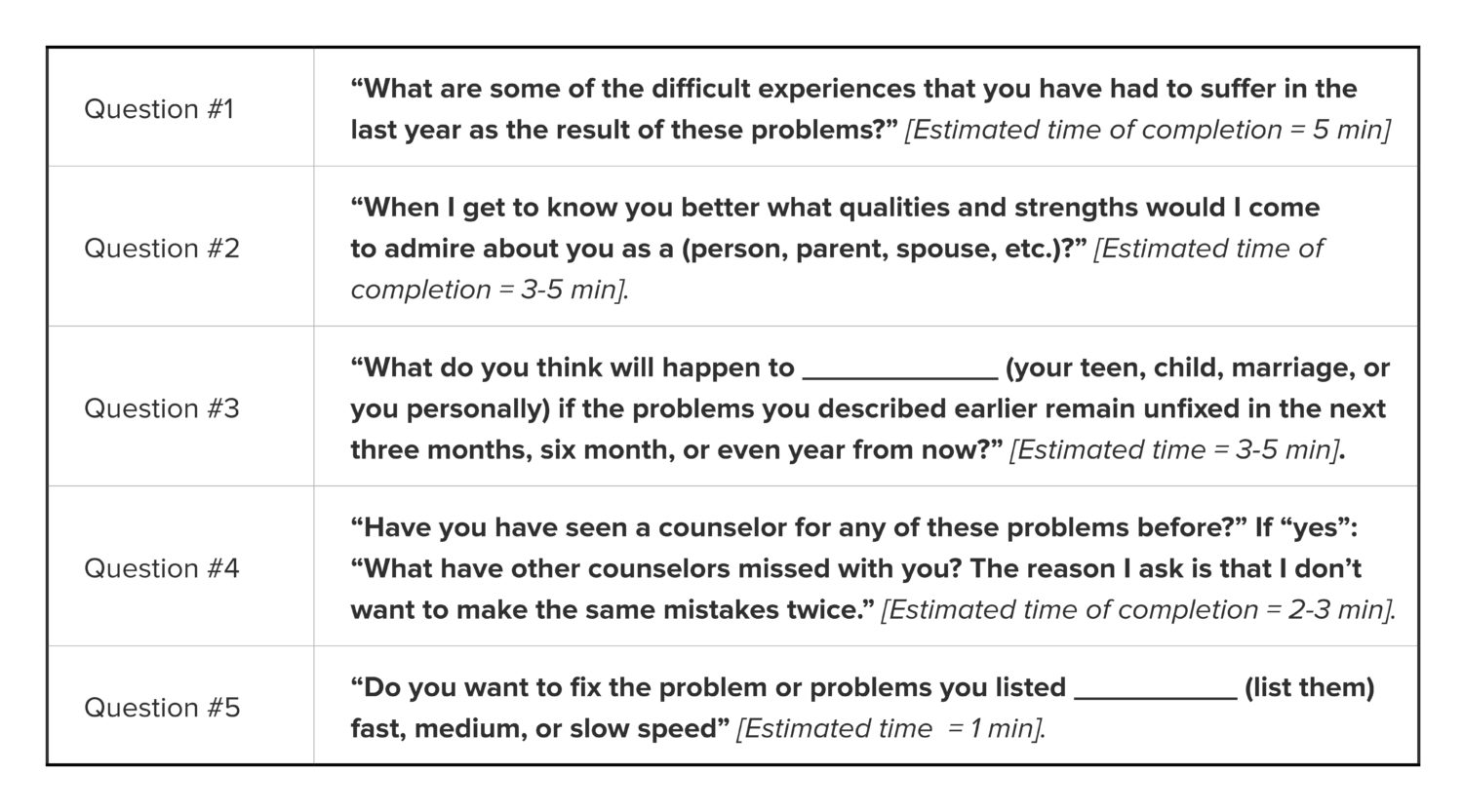High Parent Involvement is the Key to Your Trauma Treatment Success
Without parent involvement in your trauma treatment, child relapse rates skyrocket. To prevent relapse, it is important to begin building relationships before you meet with the family. That is why the FST| Family Systems Trauma Model incorporates the Motivational Interview (MI) Call Technique.
Sobering Statistics
- Poor pre-session preparation results in high appointment no-shows.
- 29% to 42% of clients fail to begin treatment (Weisner, Mertens, Tam, & Moore, 2001)
- 15% to 50% do not return for a second appointment (Festinger, Mitchell & Selmes, 2007).
Let’s face it, “You cannot treat an empty chair.”
My Personal Story
Whenever I received a child referral, I would call, ask to speak with a parent, introduce myself, and make an appointment. That’s it. If they didn’t show, I would conclude, “The parent or family is resistant or unmotivated.”
My no-show rate was about 50 percent, comparable to everyone else at my agency. I never gave it a second thought.
If the parent or caregiver did show-up, they often came in grumpy, irritated, and arms crossed. It took everything I had to build rapport, join, and breakthrough.
With 50- minute sessions and tons of forms to fill out, I simply did not have the time to join. Parents would not come back and so I never had a chance to treat the child. Game over.
Then one day a colleague and friend of mine, Jay Haley, said to me:
“Scott, you are the problem, not your client. Your parent’s so-called resistance [no show rates, premature termination, arms crossed, etc.] are the best way they know how to tell you that what you are doing is not working. If you don’t believe me, ask them yourself!”
I knew Jay Haley was the founder of strategic family therapy, but I thought, “He is off-base. He has not seen my clients. They are tough.”
Nonetheless, I decided to ask a parent if they agreed with Jay?” Not only did they agree, but they gave me an earful of angry criticism. I am paraphrasing, but basically, they said,
“Yes, I agree. When you called, I felt just like a number. There was no relationship or connection, just name, rank, and serial number. We are hurting, just the same as our kids. See our strengths, not just our flaws. And so, yes, I was resistant when I came in because my first impression of you was not positive.”
This was a light bulb moment; a crossroad in my career. Parents and kids didn’t care how much I knew until first, they knew how much I cared. I knew I had to find a new approach to begin treatment other than “name, rank, and serial number”.
Properly Beginning Treatment
In his book, Problem-Solving Therapy, Haley states: “For therapy to end properly, it must begin properly”.
But the challenge in this statement was “the how?” What was the tool or technique to join with a parent or older child over a phone call?
After eight years of research and speaking with over 1,000 parents in 15 states, I discovered how to build relationships before treatment began. At the Family Trauma Institute, we use the Motivational Phone Call Family Systems Trauma (FST) Model Technique. We begin family trauma treatment with a 15 to 20-minute phone call using a seven-question script (Figure 1).
The FST Motivational Phone Call Script
- Traditional motivational interview (MI) principles have been available for some time (c.f., Miller & Rollnick, 1991).
- Unlike traditional MI, the Family Trauma Institute developed a specialized MI phone call script using the Institute’s FST Model. Chapter Four of Treating the Traumatized Child: A Step-by-Step Family Systems Approach outlines the steps of the MI phone call technique.
- Key questions such as “If I got to know you better what qualities would I come to admire about you” facilitate partnership and high rapport building through client strengths.
Figure 1: The Motivational Phone Call Script

Motivational Phone Call Technique Results
- As the result of the MI phone call, FST outcome studies showed that parent engagement rates increased to 80% and higher.
- Even before the parents or child came into treatment, the MI script forged high rapport and a feeling of partnership between counselor and client.
Harsh Start-Up
In addition, the MI phone call created a soft vs. harsh start-up. Harsh start-ups happened when the FST therapists began treatment using a traditional start-up that was not soft (a phone call to simply schedule the first appointment). Within this context, burned-out and traumatized parents would often demonstrate high no-show rates or come to the first session with walls up and defensive body language.
Soft Start-Up
In sharp contrast, after the FST motivational phone call created a soft start-up. Parents and caregivers came to the first session more relaxed, trusting, and more receptive to the FST therapist and treatment plan.
To illustrate the power of a “soft start-up” please listen to the 2-minute audio recording of the mother answering Question #3 in the motivational phone call script:
When I get to know you better, what qualities and strengths will I come to admire about you as a [person, parent, spouse, etc.]?
This strengths-based question acts as a catalyst to revitalize traumatized and burnt out families who have forgotten how to praise one another. The question helps turn the conversation from one that is problem-saturated and hopeless to one that is praise-saturated and hopeful. Praise communication motivates resistant clients and soothes the spiritual pain that has built up over time.
Figure 2: An Audio Except: A Soft Start-Up Using Question #3
Click on the audio clip below to listen to mom’s answer to this question. Focus on the hope in her voice.
Mom’s Response to Question #3
About the Author
Scott P. Sells, PhD, MSW, LCSW, LMFT, is the author of three books, Treating the Tough Adolescent: A Family-Based, Step-by-Step Guide (1998), Parenting Your Out-of-Control Teenager: 7 Steps to Reestablish Authority and Reclaim Love (2001), and Treating the Traumatized Child: A Step-by-Step Family Systems Approach (2017). He can be contacted at spsells@familytrauma.com or through LinkedIn.

